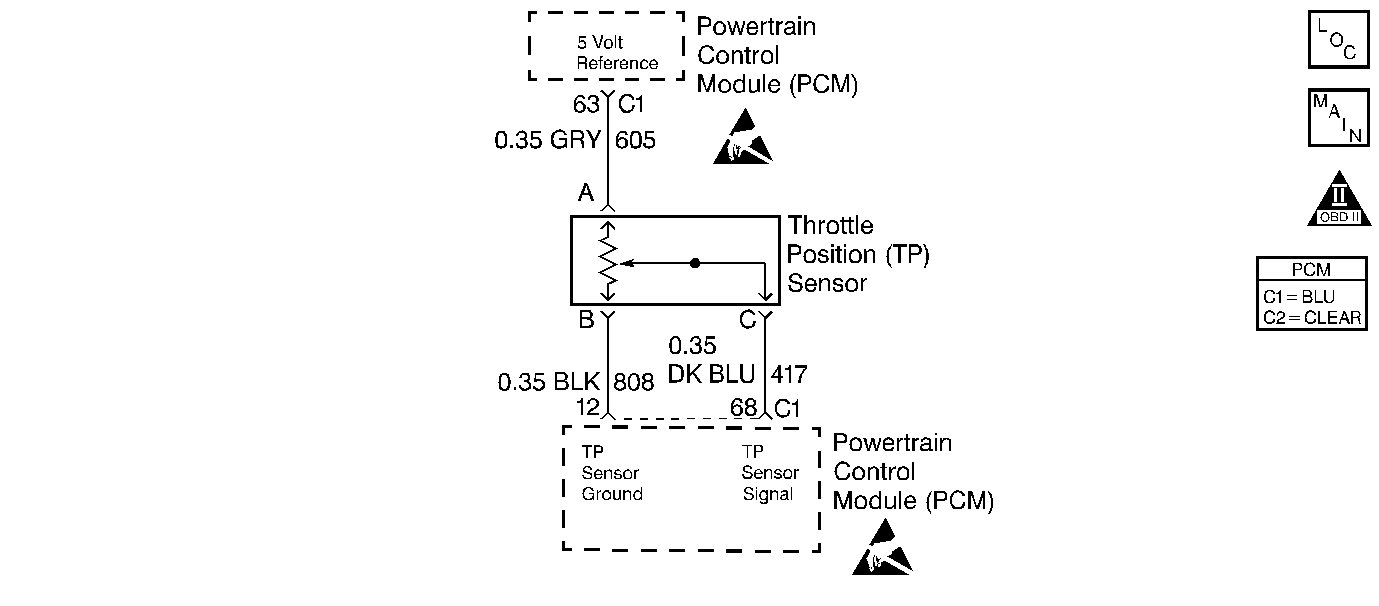
Circuit Description
The Throttle Position (TP) sensor is potentiometer. A 5 volt reference is provided on CKT 605 and ground is provided on CKT 808. The TP sensor signal CKT 417 varies between ground and 5 volts based on the position of the throttle plates. At low throttle angle, the TP sensor signal voltage is low. The PCM uses TP sensor information to determine idle, Wide Open Throttle (WOT), deceleration enleanment and acceleration enrichment. DTC P1121 sets when the PCM detects a TP sensor signal that is 4.96 volts or higher which is not possible under normal operation.
Conditions for Setting the DTC
Test Conditions
| • | DTCs P0122 and P0123 not set. |
| • | Engine speed between 0 and 3000 RPM. |
Failure Condition
Throttle position 4.96 volts or greater.
Action Taken When the DTC Sets
| • | The Malfunction Indicator Lamp (MIL) will not illuminate. |
| • | No message will be displayed. |
Conditions for Clearing the DTC
| • | A History DTC will clear after forty consecutive warm-up cycles with no failures of any non-emission related diagnostic test. |
| • | A Last Test Failed (current) DTC will clear when the diagnostic runs and does not fail. |
| • | Use a scan tool to clear DTCs. |
| • | Interrupting PCM battery voltage may or may not clear DTCs. This practice is not recommended. Refer to Clearing Diagnostic Trouble Codes in PCM Description and Operation. |
Diagnostic Aids
If fault is not present perform Powertrain Ground Check and also review Failure Rec. to determine conditions under which and how long ago the DTC set.
Test Description
Number(s) below refer to the step number(s) on the Diagnostic Table.
-
Checking if DTC P0120 is also set. If it is, go there first because it may help to pinpoint a faulty TP sensor.
-
Checking for an intermittent short to voltage in the TP sensor 5 volt reference circuit or the TP sensor signal circuit that may be causing a high TP input.
Step | Action | Value(s) | Yes | No |
|---|---|---|---|---|
1 | Was the Powertrain On-Board Diagnostic (OBD) System Check performed? | -- | Go to A Powertrain On Board Diagnostic (OBD) System Check | |
Turn the key ON. Is DTC P0120 or P0123 also set? | -- | Go to DTCs that are set | ||
3 |
Was terminal contact repaired? | -- | Go to Powertrain Control Module Diagnosis for Verify Repair | |
4 |
Was terminal contact repaired? | -- | Go to Powertrain Control Module Diagnosis for Verify Repair | |
Was a repair made to any circuit? | -- | Go to Powertrain Control Module Diagnosis for Verify Repair | Fault not present. Refer to Diagnostic Aids |
